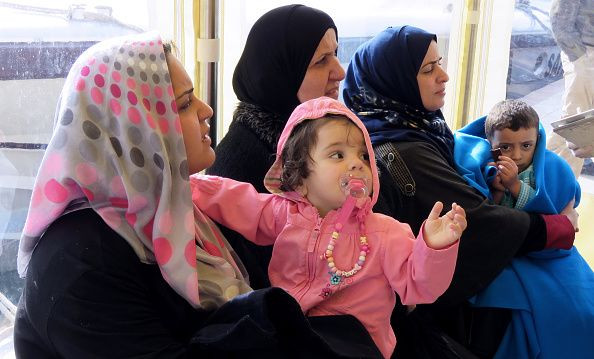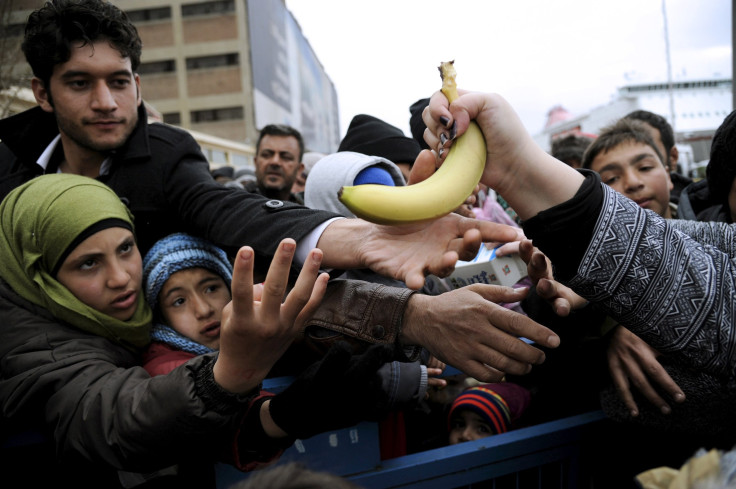Amid EU-Turkey Refugee Resettlement Talks, Questions Linger Over Human Rights, International Law

European Union leaders’ scheduled summit with Turkish authorities next week could lead to an agreement on a lingering refugee crisis that has led more than a million people to pour into Europe, but migration analysts said the framework of the proposed deal was rife with problems. Although details are still being hashed out, the current terms threaten to exacerbate an already abysmal situation for refugees in Turkey and could potentially violate Europe’s own laws for dealing with asylum seekers, they said.
“It’s kind of the same policy that’s been pursued by the EU, and that is that it’s doing its best to avoid its responsibilities of receiving refugees,” said Andrew Gardner, a Turkey-based researcher for Amnesty International, a global human rights organization. “Turkey has three million refugees, it’s the biggest receiver of refugees in the world. Many are living in pretty miserable conditions ... Turkey is making a lot of positive steps to assist refugees, but three million refugees in the context that Turkey’s in is a difficult responsibility to shoulder on [its] own.”
The proposal could see Turkey take back all migrants ineligible for asylum status who have crossed into Europe, which includes thousands of Afghans and Iraqis, as well as others from Africa and Asia. European countries would also resettle one refugee from Turkey for each refugee Turkey readmits from the Greek islands. In return, Turkey would receive billions of dollars in assistance, accelerated talks to enter the EU and permission for visa-free travel in Europe.
“What the EU should do is commit independently of any other condition to receiving refugees from countries like Turkey, Lebanon and Jordan,” Gardner said. “What it’s actually doing is not making any commitment to resettlement. It’s saying, ‘We’re going to send refugees back to Turkey, the largest host of refugees, for each one of these people that risks their lives.’”

Susan Fratzke, a policy analyst at the Migration Policy Institute, a Washington-based think tank, said the European proposal raised tricky legal questions. Various human rights groups, such as the United Nations High Commissioner for Refugees, have said the current plan violates the right to protection under both European and international law.
“I’m not sure that this is legal, I think there are a lot of legal concerns,” Fratzke said. “I don’t think the legal concerns are at the forefront of the EU political leaders’ minds. They are interested in finding something that works and they will deal with the legality later.”
Turkey is already struggling to integrate a massive refugee population whose members, by just about any account, have little chance of returning home soon. Although many migration experts say the Turkish government has been generous, the refugees’ lives in the country have been stained by exploitation, poverty and restrictions.

While Middle Eastern countries such as Jordan, Lebanon and Turkey, have borne the brunt of the refugee crisis, Europe saw more than a million people cross into its borders last year. As border restrictions have become tighter, both migrants and refugees have been willing to pay increasingly high prices to be taken by smugglers across the Mediterranean Sea in a journey that has become more and more dangerous.
An already bleak situation for refugees in Turkey could worsen with the proposed deal, some said they feared. As the Syrian Civil War has continued, refugees have become fed up with their limited legal status, which restricts their ability to work and travel freely. And with Turkey struggling to cope with its own domestic political issues — many of them exacerbated by the nearly 5-year-old war in neighboring Syria — there’s not much support among Turks for even more refugees, said Aboud Dandachi, a Syrian refugee living in Istanbul.
“The future for Syrians in Turkey is really uncertain. It’s obvious the government still doesn’t have the long-term plan to deal with the refugee crisis, to deal with integrating Syrians into society,” said Dandachi, who has published a book on the Syrian crisis. “They can’t cope with more refugees. They don’t want any more. The Turks have had enough, they are so compassionate toward refugees, but Turks are pretty fed up with Europe.”
Dandachi said refugees were watching the talks between Europe and Turkey closely, but many were not optimistic about its prospects. “People are looking for a light at the end of the tunnel,” he said.
Hey #Europe, pushing #people back to #Turkey is no solution. It just means that the suffering takes place elsewhere. pic.twitter.com/jvlYZUVVvA
— MSF Sea (@MSF_Sea) March 8, 2016
The Migration Policy Institute’s Fratzke said even more complicated than integrating Syrians into Turkey would be doing the same with thousands of migrants, including Afghans, Iraqis and Moroccans. Whereas authorities have worked out a legal framework for dealing with Syrian refugees, that is not the case for individuals from other countries.
“They’re coming from failed states, with much lower levels of education and trauma — which Syrians have been experiencing, too — but when we’re talking about Afghanis or Iraqis, many are coming from situations where they may not be as prepared to integrate immediately as some of the Syrians have,” Fratzke said.
Even if a deal is reached, Fratzke wasn’t certain it was possible to successfully stem the flow of refugees into Europe. Instead, smugglers were likely to push up prices and find indirect, more dangerous paths.
“What we’ve seen in the past is that when one route is closed off, new routes are opened,” Fratzke said. “At this point, it’s sort of difficult to put the genie back in the bottle.”
© Copyright IBTimes 2024. All rights reserved.






















